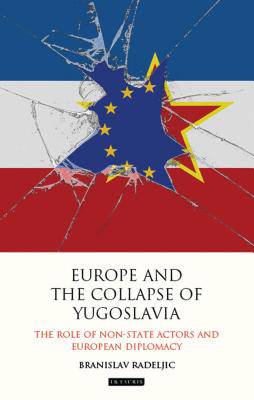
Bedankt voor het vertrouwen het afgelopen jaar! Om jou te bedanken bieden we GRATIS verzending (in België) aan op alles gedurende de hele maand januari.
- Afhalen na 1 uur in een winkel met voorraad
- In januari gratis thuislevering in België
- Ruim aanbod met 7 miljoen producten
Bedankt voor het vertrouwen het afgelopen jaar! Om jou te bedanken bieden we GRATIS verzending (in België) aan op alles gedurende de hele maand januari.
- Afhalen na 1 uur in een winkel met voorraad
- In januari gratis thuislevering in België
- Ruim aanbod met 7 miljoen producten
Zoeken
Europe and the Collapse of Yugoslavia The Role of Non-State Actors and European Diplomacy
Branislav Radeljic
€ 271,45
+ 542 punten
Omschrijving
In 1992 Yugoslavia finally succumbed to civil war, collapsing under the pressure of its inherent ethnic tensions. Existing accounts of Yugoslavia's dissolution, however, pay little regard to the troubled relationship between the Yugoslav Federation and the European Community (EC) prior to the crisis in the early 1990s, and the instability this created. Here, Branislav Radeljic offers an empirical analysis of the EC's relations with Yugoslavia from the late sixties, when Yugoslavia was under the presidency of Josep Broz Tito, through to the collapse of the Yugoslav federation in 1992, after the rise of Slobodan Milosevi? and the beginning of the Yugoslav Wars. Radeljic explores the economic, political and social elements of these discords, and also places emphasis on the role of Slovenes, Croats and other diasporas - focusing on their capacity to affect policy-making at a Europe-wide level. Radeljic argues convincingly that a lack of direction and inadequate political mechanisms within the EC enabled these non-state actors to take centre-stage, and shows how EC paralysis precipitated a bloody conflict in the Balkan region.
Specificaties
Betrokkenen
- Auteur(s):
- Uitgeverij:
Inhoud
- Aantal bladzijden:
- 272
- Taal:
- Engels
- Reeks:
Eigenschappen
- Productcode (EAN):
- 9781848859890
- Verschijningsdatum:
- 15/09/2012
- Uitvoering:
- Hardcover
- Formaat:
- Genaaid
- Afmetingen:
- 142 mm x 218 mm
- Gewicht:
- 458 g

Alleen bij Standaard Boekhandel
+ 542 punten op je klantenkaart van Standaard Boekhandel
Beoordelingen
We publiceren alleen reviews die voldoen aan de voorwaarden voor reviews. Bekijk onze voorwaarden voor reviews.









